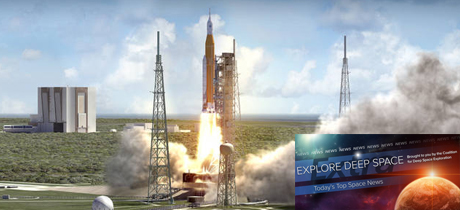In Today’s Deep Space Extra… NASA moves close to establishing a new target launch date for the first test flight of the Space Launch System (SLS) rocket. Exploration Mission-1 (EM-1) will start an uncrewed Orion capsule on a journey around the moon and back to Earth.
Human Space Exploration
Todd May: NASA will decide SLS launch date “soon”
Spacepolicyonline.com (10/12): NASA has been forced to review plans for the first launch of the Space Launch System (SLS), Exploration Mission-1 (EM-1), because of hurricane and tornado events in Texas, Louisiana and Florida this year as well as technical challenges. Todd May, the director of NASA’s Marshall Space Flight Center, said a new date for the mission that will send an unmanned Orion capsule launched atop the first SLS around the moon and back to Earth should be announced soon, replacing the old December 2018 target. The first SLS/Orion launch with crew, EM-2, faces a considerable delay as well.
NASA to leverage current planning for 45-day exploration report
Space News (10/13): During the October 5 first meeting of the re-established White House National Space Council, Vice President Mike Pence, the council’s chair, directed NASA to come up with a return to the moon strategy within 45 days. NASA will fulfill the assignment with work already underway within the agency, according to NASA’s Jason Crusan, head of NASA’s advanced exploration division. The review itself is not expected to impact the first test flight of the Space Launch System (SLS) rocket with an uncrewed Orion capsule. The date for Exploration Mission-1 (EM-1) is under review.
What role will NASA play in getting humans to Mars?
Space.com (10/12): NASA’s role in reaching Mars with human explorers could well be that of orchestrator of efforts from the commercial sector as well as international partners, according to NASA’s Bill Gerstenmaier, associate administrator for human exploration and operations. A priority could be setting standards for technology and safety, much like the existing international docking standard and air quality and pressure standards for habitable modules envisioned for the lunar orbiting Deep Space Gateway (DSG).
Three spacefarers from three nations prepare for four-month mission to Space Station
AmericaSpace.com (10/12): The U.S., Russian and Japanese trio of Scott Tingle, Norishige Kanai and Anton Shkaplerov are prepped for a December 17 liftoff from the Baikonur Cosmodrome in Kazakhstan aboard their Soyuz spacecraft for a four month tour of duty aboard the International Space Station. They discussed their upcoming flight earlier this week in a news briefing from NASA’s Johnson Space Center.
Space Science
Small asteroid gives Earth a close shave in highly anticipated flyby
Space.com (10/12): As predicted, the asteroid 2012 TC4 passed by the Earth at just 26,000 miles on Thursday at 1:42 a.m., EDT. After tracking the 30 to 50 foot wide asteroid, NASA incorporated the encounter into a planetary defense exercise.
Other News
Rep. Marcy Kaptur and colleagues establish congressional NASA caucus
Cleveland Plain Dealer (10/12): Two members of the U.S. House from Ohio and California will co-chair a new NASA congressional caucus. They are U.S. Rep Marcy Kaptur, a Democrat, of Toledo, Ohio, and U.S. Rep. Steve Knight, a Republican from California’s Antelope Valley. They intend a bipartisan effort to strengthen awareness of NASA’s economic, science and national security contributions.
50 years later, the Apollo 11 command module still dazzles
Ars Technica (10/12): With the 2019 approach of the 50th anniversary of the first human moon landing, the Apollo 11 mission flown by the late Neil Armstrong, Buzz Aldrin and Mike Collins, the Smithsonian Institution is taking the three men’s NASA Columbia command module on a U.S. tour. The first stop is Space Center Houston, the official visitor’s center for NASA’s Johnson Space Center, where the historic spacecraft will remain on public display into March. Columbia is sharing display space with America, the Apollo 17 command module for the crew of the final lunar landing mission. Next year, Columbia will move on to St. Louis, Pittsburgh and Seattle for public display.
Launch of Russia’s fastest space cargo mission yet aborted in final minute
Space.com (10/12): Russia halted the planned launch Thursday of its latest Progress cargo mission to the International Space Station. It may be re-scheduled for Saturday. Roscosmos, Russia’s space agency, planned an accelerated 3 1/2 hour, two orbit launch to docking with the Station’s Russian segment. The delay will require a change to a two day, 34 orbit launch to docking because of orbital mechanics. Crewed Soyuz missions could drop the current six hour, four orbit transit for the faster 3 1/2 hour, two orbit trek if a cargo mission can demonstrate the strategy first.

